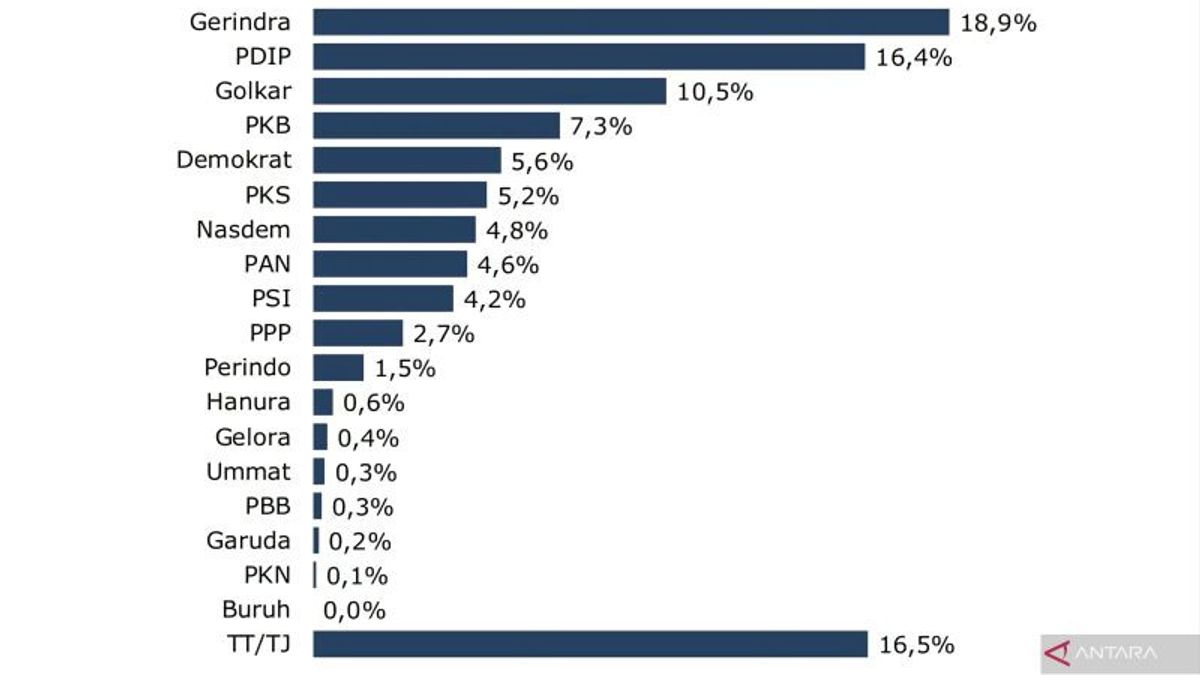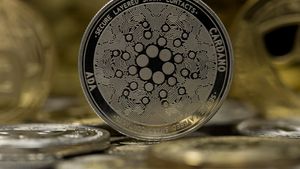JAKARTA - The Economics & Political Insight (EPI) Center survey shows Gerindra becoming the highest electability political party with 18.9 percent support followed by PDI Perjuangan (PDIP) with 16.4 percent support.
The EPI Center predicts that the political party contestation map will take place dynamically and Senayan is expected to have newcomers, namely the Indonesian Solidarity Party (PSI), whose electability has exceeded 4.2 percent or has crossed the parliamentary threshold of 4 percent.
"Gerindra is projected to win the 2024 General Election as well as defeat the dominance of PDIP, as well as the emergence of newcomers in Senayan where PSI's electability penetrated 4.2 percent," said EPI Center researcher Mursalin in a written statement received by Antara Jakarta, Saturday.
According to Mursalin, Gerindra's potential victory is closely related to the 2024 presidential election contestation map.
"The support given by President Jokowi to Prabowo-Gibran leverages Gerindra's electability as the main supporting party," said Mursalin.
SEE ALSO:
This also proves the strong factor of Jokowi in increasing the electability of the party he supports. In the 2014 and 2019 elections, PDIP votes were maintained in the range approaching 20 percent, up from the 2009 elections which only ranged from 14 percent.
Conversely with Gerindra, where Jokowi became Prabowo's rival in the 2014 and 2019 elections, his vote was only around 11-12 percent. PDIP's vote acquisition is threatened with erosion, where PDIP's pockets become Prabowo-Gibran's land.
Finally, the departure of Maruarar Sirait, who is the son of the founder of PDIP, strengthened the phenomenon of voter shifting, continued Mursalin.
The magnitude of Jokowi's factor was also seen in PSI's surge in electability, after previously the new party in the 2019 election failed to penetrate Senayan. The increase occurred after Kaesang Pangarep, one of Jokowi's sons, became chairman of PSI.
Jokowi, who wants to ensure the sustainability of his programs after serving for two terms, feels the need to continue to influence election actors. Apart from Gibran who was appointed as Prabowo's vice presidential candidate, Jokowi's influence on the party also entered through Kaesang.
PSI itself from the start positioned itself as a strong supporter of President Jokowi's leadership.
"PSI even developed the Jokowi ideology which was interpreted as Indonesia's progress under Jokowi's leadership," explained Mursalin.
PSI's entry as a newcomer to Senayan is inversely proportional to the fate of PPP, which based on the EPI Center survey, has only 2.7 percent electability.
The Economics & Political Insight (EPI) Center survey was conducted on January 9-15, 2024, face-to-face to 1200 respondents representing 38 provinces. The survey method is multistage random sampling, with a margin of error of around 2.9 percent and a confidence level of 95 percent.
The following are the complete results of the electability of EPI Center's political parties: 18.9 percent Gerindra, 16.4 percent PDIP, 10.5 percent Golkar, 7.3 percent PKB, 5.6 percent Democrats and 5.2 percent PKS.
Furthermore, Nasdem 4.8 percent, PAN 4.6 percent, PSI 4.2 percent, PPP 2.7 percent, Perindo 1.5 percent, Hanura 0.6 percent, Gelora 0.4 percent, Ummat 0.3 percent, PBB 0.3 percent, Garuda 0.2 percent, PKN 0.1 percent, and Labor 0.0 percent, while respondents who said they did not know / did not answer 16.5 percent.
The English, Chinese, Japanese, Arabic, and French versions are automatically generated by the AI. So there may still be inaccuracies in translating, please always see Indonesian as our main language. (system supported by DigitalSiber.id)
















